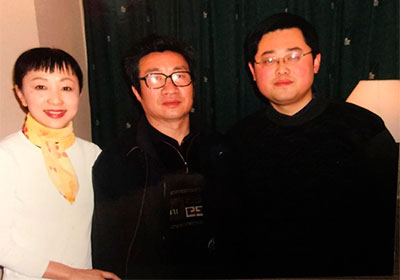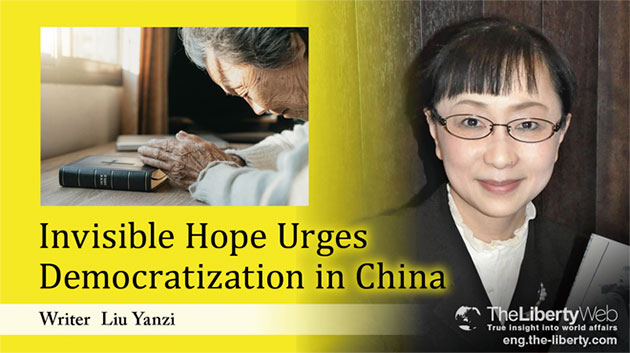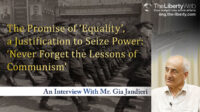Invisible Hope Urges Democratization in China
Religious persecution in China is becoming ever more intense. The Liberty interviewed a writer who resides in Japan and is known for their research on freedom of speech in China, regarding China’s reality.
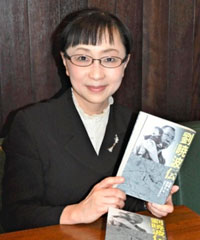
About Liu Yanzi: She grew up in China and came to Japan in 1991 as an international student. She currently teaches at universities in Japan while producing her own writings and translations as a Japanese-Chinese bilingual writer. Yanzi’s works include “Cultural Revolution in Tibet” (original title: Tibet-no-bunkadaikakumei), “Legend of Liu Xiaobo” (original title: Liu Xiaobo-den), “Cultural Chinese Learned With Charter 08” (original title: Reihachi kensho-de-manabu-kyoyo-chugokugo), “From Tiananmen Square to Charter 08” (original title: Ten’anmon-jiken-kara-“08 kensho”-e) and “The Ideology Behind ‘I Have No Enemy’” (original title: “Watashi-ni-wa-teki-wa-inai”-no-shisou).
――What are your thoughts on the two-year extension of the provisional agreement on the appointment of bishops between the Vatican and China?
Ms. Liu: In a nutshell, believers who have pledged allegiance to the Roman Catholic Church have been abandoned. The number of believers in Europe are declining, so I think this extension was built on the incentive to gain believers in Asia, especially in China.
However, there are approximately 200,000 Catholics in Taiwan, and the Vatican is Taiwan’s only diplomatic ally in Europe. The question now is whether the Vatican will maintain this diplomatic tie or cut them off in favor of China.
――China has also tampered with the Bible material in its university textbooks.
Ms. Liu: In the first place, China doesn’t officially allow Bibles to be sold. You can only obtain Bibles from the Three-Self Patriotic Movement or the Chinese Patriotic Catholic Association which are both under the CCP. Some claim that the content of their Bible doesn’t stay faithful to the traditional Bible. So, for the past 70 years, the Vatican doesn’t even know if its believers are studying the correct teachings. This is a very scary fact of the matter.
This time around, China altered its Bible to claim that Jesus Christ killed a woman who committed crime without forgiving her. Falsifications like this have been conducted many times in China’s past.
Some examples are of the Great Leap Forward and the Cultural Revolution. Accurate numbers of victims haven’t been revealed. One theory is that the Great Leap Forward involved more than 30 million people who starved to death and the Cultural Revolution involved approximately 100 million people. We don’t know how many casualties were really inflicted. For our generation, the same can be said for the Tiananmen Incident. The next generation doesn’t know our tragic history. With these things in mind, it is no surprise that further falsifications of the Bible have been occurring.
China Fears Religion That Spreads Below the Surface
――Why is the CCP taking such an approach when it’s obvious that the world will criticize them?
Ms. Liu: That’s most likely because they’re scared of the religious force that is spreading from all over the place. It is said that there are about 90 million CCP members, but at the same time, there is almost the same number of Christians. There’s a quiet boom in religion that is taking place in China, and it’s not just for Christianity. The number of believers of Buddhism, Islam and indigenous religions are growing. The Communist Party leaders are taking part in religious persecution because they’re scared of growing religions.
There are many house churches and underground churches within China’s Christianity that meet discreetly in apartment rooms. It looks like an ordinary apartment or a mansion from the outside, so it’s hard to tell until you actually enter the rooms.
On top of that, people who practice faith aren’t influenced by the CCP education. Religious practitioners are aware of universal values from a transcendental perspective that is running through religion, so they’re not brainwashed by the CCP.
――What do you think is the role of people of faith?
Ms. Liu: I think that China’s democratization depends on the strength of people who practice faith. Religions like Christianity and Buddhism contain universal teachings, and modern political principles, in part, stemmed from these religious teachings. I believe that people with faith have an invisible hope that will eventually become a great force.
The CCP also has an army, and you may think that nothing can be done to counter their extreme authoritative force. But, if these things that are visible to the eye happen to collapse, it will collapse in the blink of an eye.
Democracy activist Liu Xiaobo and Wang Yi, a Christian pastor who has been imprisoned, both had the courage to speak the truth. People like them who have been imprisoned by the Chinese government may seem like losers in life, but their lives of speaking the truth and continuously fighting will spark an invisible hope. It’s important to pass on their way of life.
Faith Gives Courage to Speak the Truth
Ms. Liu: China holds the value of communism, so as Marx said that ‘religion is the opium of the people,’ China denies religion. Therefore, many people in Japan may not feel that Chinese people have faith or a sense of religiosity. You may even think that Chinese people are only pragmatic and good at business.
Those things are not true. Since 1946, during the Chinese Civil War, people of faith have been resisting the force of the CCP through non-violent means. Communist Party leaders consider themselves gods, and they never tolerate religious people. Still, the current reality is that religion is spreading from rural areas.
I was staying in Wenzhou, Zhejiang, during my fieldwork, and there were house churches everywhere. I often heard hymns on Sundays. Religious issues are at the heart of Chinese people, more than you’d think.
This is why I want to document how people of faith came about ever since the Tiananmen Incident.
Wang Yi’s Way of Life: Following the Voice of His Soul
Ms. Liu: A leading example is aforementioned Mr. Wang Yi, a Christian pastor who has been imprisoned. Mr. Wang was originally a legal scholar at Chengdu University, so he wasn’t on the typical path to become a pastor. Looking back at the time, Mr. Wang claimed that he himself was neither a religious believer nor an atheist.
There was a turning point when Mr. Wang was selected as one of the ’50 public intellectuals who have influenced China’ in the Southern People Weekly for advocating his resistance to the CCP’s dictatorship and defending human rights while teaching at the University. As a result, the authorities had their eyes on him, and Mr. Wang had to leave the University. He says that at the time, he felt that ‘studies alone won’t change the system.’
Amid his distress, he got involved as a lawyer in two trials against Christians. During these trials, he studied the Bible and hymns and deepened his thoughts on faith.
Mr. Wang began a Bible study session with his wife, Jiang Rong, and Christians gradually gathered to the point where he founded a house church — the Chengdu Early Rain Reformed Church [renamed as the Early Rain Covenant Church in 2010].
His church became bigger as membership grew to several thousand, and he supported people of conscience (note: a group of people with common sense who are not of specific religious sects) until he was imprisoned in 2018 for inciting subversion of state power. Mr. Wang’s church serves as the last resort for those who have been persecuted.
In his declaration of disobedience to the government, Mr. Wang said, ‘…no one in this world can force me to renounce my faith; no one can make me change my life; and no one can raise me from the dead.’ As his words represent, faith is the source of ‘courage to tell the truth’ without giving in to religious persecution and crackdowns from the government. I firmly believe that this power of faith will be one of the driving forces for China’s democratization.
Activists Who Let Go of Themselves to Pass On Universal Values
――What kind of things do you expect from Japan as a neighboring country?
Ms. Liu: China has concealed a number of issues, including human rights abuses in Tibet and Inner Mongolia, as well as of Uighurs. China is also concealing information on the spread of the coronavirus from Wuhan, causing trouble to the world.
While all this is going on, Japan as a neighboring country is remaining silent. Rather, it seems that the Japanese people want to maintain economic relations with China and nothing else matters to them. I can only say that they will have to pay the consequence of continuing such selfish behaviors. There’s no such thing as ‘one-country pacifism.’
Mr. Wang, who I mentioned earlier, and Mr. Liu Xiaobo, a democracy activist, were imprisoned as a result of their activities. Mr. Liu even died in prison. It may seem like their way of life failed, but I believe there’s a universal value in holding onto your courage to tell the truth and fighting on until the end.
Japan is certainly a democratic country, but if the people of Japan cannot express their opinions on the basis of universal values, I must say that Japan’s democracy will collapse.
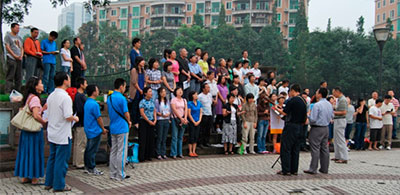
Mr. Wang Yi and members of the Early Rain Covenant Church sing hymns during outdoor worship service.
